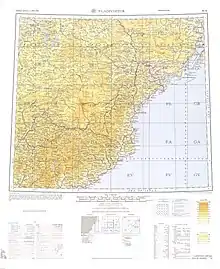Hun-ch'un
English

Map including HUN-CHʻUN (AMS, 1967)
Etymology
From Mandarin 琿春/珲春 (Húnchūn), Wade–Giles romanization: Hun²-chʻun¹.
Pronunciation
- enPR: ho͝onʹcho͝onʹ
Proper noun
Hun-ch'un
- Alternative form of Hunchun
- 1888, James, H. E. M., “Sansing to Ninguta and Hun-ch'un”, in The Long White Mountain or A Journey in Manchuria, Longmans, Green, and Co., →OCLC, page 346:
- Hun-chʻun is essentially a garrison town, though there are a few dealers in seaweed, toadstools, and medicinal roots, large quantities of which are sent to Ninguta and Kirin, and thence to all parts of China. There is also a considerable trade in deer-horns.
- 1904, B. L. Putnam Weale, Manchu and Muscovite, Macmillan and Co., →OCLC, page 52:
- In this fashion China completely lost access to the Sea of Japan, and surrendered what is to-day the important province of the Primorsk to the northern power. The nearest point on Chinese territory to the coast in this extreme east is Chinese Hun-ch'un, which stands some thirty miles inland from Passiet Bay.
- 1984, Ki-baik Lee, Edward Willett Wagner, transl., A New History of Korea, Harvard University Press, →ISBN, →OCLC, pages 89-90:
- The capital of Parhae, called Sanggyŏng or "High Capital" was located at modern Tung-ching-ch'eng in Hei-lung-chiang province, Manchuria, and there were four secondary capitals- the "Central Capital" at modern Tun-hua in Chi-lin province, Manchuria, "Eastern Capital" at Hun-ch'un in Chi-lin, "Southern Capital" at Hamhŭng in South Hamgyŏng province, Korea, and "Western Capital" at Lin-chiang in Chi-lin [see map p. 70].
- 2008, Rodney P. Carlisle, Day by Day: The Twenties, volume 1, Facts on File, →ISBN, →OCLC, page 82:
- The armed Korean independence movement attacks Hun-ch'un, in eastern Manchuria, and kills Japanese consulate police.
-
Translations
Hunchun — see Hunchun
Anagrams
This article is issued from Wiktionary. The text is licensed under Creative Commons - Attribution - Sharealike. Additional terms may apply for the media files.